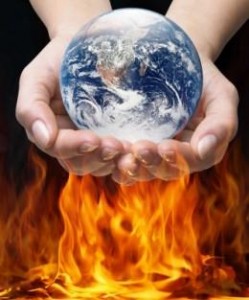How and why ‘Sci-fi’ gave birth to ‘Cli-fi’
December 14, 2013 | 11:30 am
|
|
|
|
|
|
|
By Dan Bloom
 Sci-fi has had a long run as a modern literary genre, and it’s been fun, far-reaching and mind-expanding. Not to mention spacy, too. And clocks that strike “13″ and trips to Mars and beyond. I grew up on sci-fi and I love it. Books and movies, short stories, too. Long live, sci-fi.
Sci-fi has had a long run as a modern literary genre, and it’s been fun, far-reaching and mind-expanding. Not to mention spacy, too. And clocks that strike “13″ and trips to Mars and beyond. I grew up on sci-fi and I love it. Books and movies, short stories, too. Long live, sci-fi.Oh, and did I mention, sci-fi is also ground-breaking and Earth-shaking. Its many writerly practitioners, from David Brin to Ursula Le Guin, and hundreds (thousands) more, worldwide, rock! There’s a great sci-fi website, too, run by Annalee Newitz — io9.net.
But there’s a new kid on the literary block and she’s called Cli-fi. Rather than look outward at the stars and the cosmos, cli-fi looks inward, at our warming planet, this third rock from the sun, a planet in trouble.
Margaret Atwood does not write cli-fi per se, but her trilogy ending with ”Madaaddam” gets close. She doesn’t call her novels cli-fi, though, preferring the term of “speculative fiction.” Some cli-fi writers today: Nathaniel Rich, Barbara Kingsolver, Ian McEwan and hundreds more, many of them with cli-fi novels coming out in 2014 and 2015. The newly emerging genre is rising, as Rodge Glass said in the Guardian.
Scott Thill calls cli-fi ”a critical prism”. He’s writing an ebook on this prism right now.
Joe Follansbee is writing a cli-fi novel now. So it Yaron Glazer. Mary Woodbuy wrote one last year. Richard Diefenbeck, Jr., just released his cli-fi ebook on Kindle. Sarah Holding in London has one out now, too. The global cli-fi community online is growing and their books are coming out in both print and as ebooks.
So if you’re a writer, looking to write a cli-fi novel, where do you begin? And do you plan it for an ebook platform or a print paperback? Or both?
How do you create a climate themed novel that might perhaps have an impact on readers, the kind of impact that Neville Shute’s “On the Beach” had on the nuclear bomb question long ago? Remember those fears?
Come 2014, you sit down and start writing. Make a resolution. Do it your way. Join the growing cli-fi community of writers in North America and Europe.
You will go where your imagination takes you. You will study the facts on the ground and in the air. You will tailor your novel for a “Day After Tomorrow” post-Hollywood world, for a readership like the community that reads Cormac McCarthy’s “The Road.”
Mostly, you tell a riveting story. You create a world, and you put your own cast of characters in that world to both entertain and inform readers. Cli-fi is not just a marketing buzzword. It’s a genre that seeks impact. It already has a hashtag on Twitter — #clifi — and the community of writers and would-be writers is growing week by week. I get emails every day from potential cli-fi novelists wanting to know more about the genre (I tell them to Google or Wiki it).
The world is on fire. C02 emissions are out of control. The PPM of carbon dioxide is now over 400 and climbing. That’s parts per million, science-talk.
Cli-fi is not SF, but it owes a lot to the earlier genre. Maybe, as some say, cli-fi is a subgenre of sci-fi and that’s cool, too.
Cli-fi does not have set rules or an agenda. Novelists and short stories writers can go where their imagination takes them. Climate skeptics can write cli-fi novels, too. Sure. The community is open to all. Worldwide.
Have you read a cli-fi novel recently? If not, you soon will.
Cli-fi is where art meets science, where data meets emotions, and where science meets art, too. It’s a storyteller’s template, and it’s time has come. Over the next 100 years, cli-fi as a genre will bloom and blosson. Hopefully, it will also have an impact.
A film reviewer in Florida, Roger Moore, in writing about a new sci-fi movie titled “The Last Days on Mars,” didn’t really cotton to the the storyline and concluded: “[The movie shows] how starved of new ideas sci-fi cinema is.”
Don’t let this happen to cli-fi. Rather than being starved for ideas, it has a long, long future ahead in our warming world. As either a reader or a writer, embrace it. This is our destiny.

